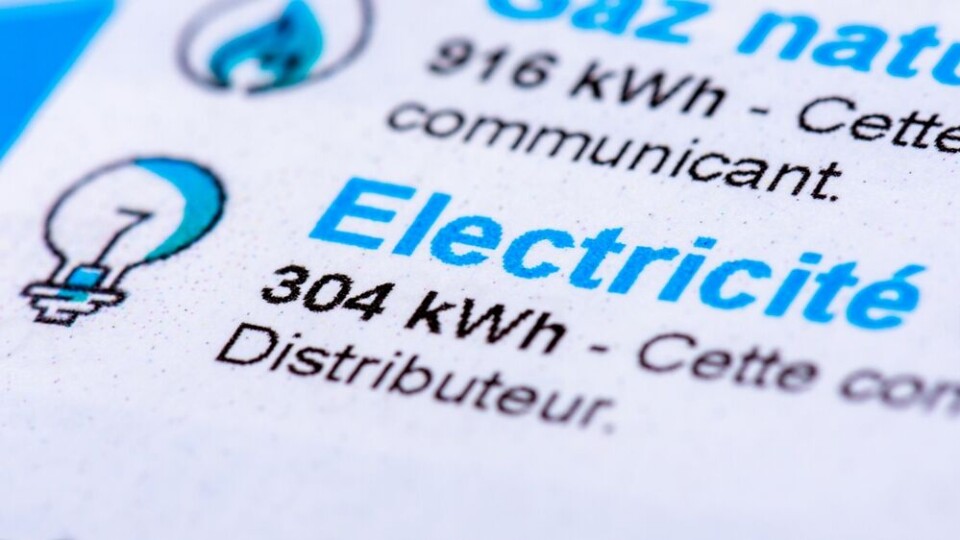-
Why your car insurance in France is expected to increase this year
Premiums are forecast to rise by four to six percent in 2026
-
Two Britons killed in avalanche in French Alps were with an instructor
French skier also died in the disaster at Val d’Isère on Friday February 13
-
British Airways launches bargain £2 flights to France (but there’s a catch)
The flights are only available to members of the airline’s Avios scheme who are redeeming loyalty points
Anger over huge bills from alternative electricity providers in France
Bills of over €9,000 have been reported. Providers say it is linked to rising supply costs, but a consumer collective says suppliers are breaking the law

Increasing numbers of people in France have been reporting very high electricity bills from alternative energy providers, especially Eni, including up to €10,000 in some extreme cases.
The bills have arrived during the height of summer, showing that they are not linked to excess usage but to electricity providers’ increasing charges.
On social media, shocked users have been sharing photos of their sky-high bills. One received a bill for €2,672, another for €5,185; and in some shocking cases, demands for up to €10,000.
One client of provider Eni, Vincent Audigier in Seine-et-Marne, received a bill of more than €9,000.
He has now created a collective of 70 clients, in a bid to fight the charges. He told FranceInfo: “I was an extreme case…but there are people with [a bill of] €4,000, others up to €1,640. I still have one for €7,194. There are many different amounts but the average is about €2,500.”
Anthony and Elise, a couple with four children from Le Havre, said that on July 5, they received a bill of €1,600 from Eni, despite low consumption and significant efforts to reduce their usage.
Anthony said: “It's a huge sum. It's the equivalent of a [monthly] salary.”
He added: "We have only consumed 7,000 kWh out of the estimated 10,200. Over the last three years, we've made a major effort [to reduce our consumption, including] installing a wood-burning stove, switching to LED lighting, and even a solar hot water tank.”
Why such an increase?
Eni has said that the cost is linked to the increased cost of supplying electricity and said that higher prices have only been passed to customers who renewed their contracts after their contracts’ expiry date.
It said that any new pricing would be reflected in clients’ monthly installments, and that any other changes would be dealt with on a case-by-case basis.
Electricity prices have generally been rising also as a result of the gradual end of the tariff shield (‘bouclier tarifaire’), and the regulated electricity tariff rose by a further 10% in August. This is set to continue.
Read more: Electricity bills in France to rise by 10% from August 1
Marie-Amandine Stévenin, president of UFC Que-Choisir, told FranceInfo that the “explosion in bills” could also be explained by the fact that “some tariffs are not capped [or limited].” This is in contrast to regulated tariffs, which have risen by just €150-160 per year on average.
As for Mr Audigier, he has accused Eni of a lack of transparency on rises, and of breaking the law.
He said that his monthly bill had increased by just €10 per month, and he had received his huge bill later, despite a lower-than-average consumption over the relevant period.
He explained that he had received a letter from Eni, dated August 7, 2022, which thanked him for renewing with them. However, the letter also said that “from September 7”, Eni was changing the offer conditions, with a list of tariffs “full of cents”, he said.
“Even though we might have read this letter in good time, you can’t understand a word of it,” he said.
Mr Audigier and his collective are now bringing a case against Eni, and claim that the company broke the law by not communicating clearly.
What does the law say?
Caroline Keller, head of the information and communication department at the energy ombudsman, le médiateur de l'énergie, said that suppliers must give clients one month’s notice very clearly before changing prices.
She said: “If they just send an email without saying that prices are increasing by 20%, we consider that the information is not right.”
Ms Stévenin, from UFC-Que Choisir, added: “If consumers don't want the new tariff, their only right is to leave. They can’t force the supplier [not to raise their prices]. But if the supplier has not informed the consumer [properly], it can be assumed that the existing tariff continues to apply.”
Eni has said that it did communicate changes to customers. Yet, Mr Audigier is not alone in claiming that the communication was unclear.
One member of the collective, Estelle, a pharmacist from Nancy, received a bill of €3,200. She said that she felt “tricked” because her monthly bills had not increased from €90, even after her contract was renewed last October.
She said: “I feel as though it’s been done on purpose, in a way that we don’t realise immediately. Because of course, if I had realised from October, I would have left Eni.”
Eni is not the only company to have received increased complaints to the médiateur de l'énergie. And in 2022, the agency itself singled out three other suppliers: Mint Energie, Méga Energie, and Wekiwi, for a lack of transparency on prices and changing contracts.
Read more: French energy suppliers criticised for ‘problematic’ pricing practices
Even mainstream provider Engie has received increased numbers of complaints and disputes.
Ms Keller, from the médiateur de l'énergie, said: “In 2022, we received around 5,000 disputes relating to the prices applied. That's twice as many as in 2021 and we’re seeing the same trend in 2023.”
Related articles
French energy suppliers criticised for ‘problematic’ pricing practices
Electricity prices are rising in France: How much more will you pay?
Electricity bills to rise in France as price rise protection reduced
























